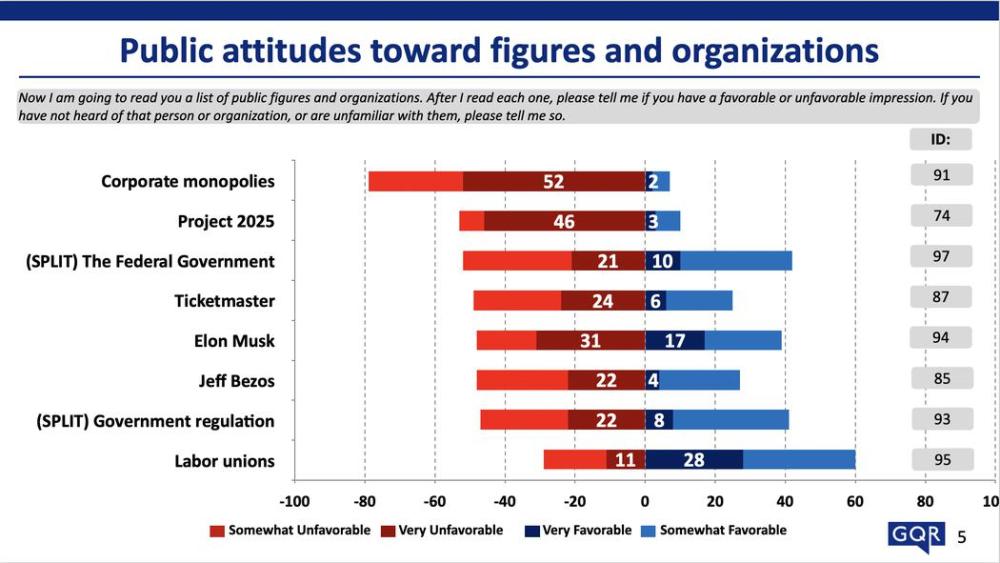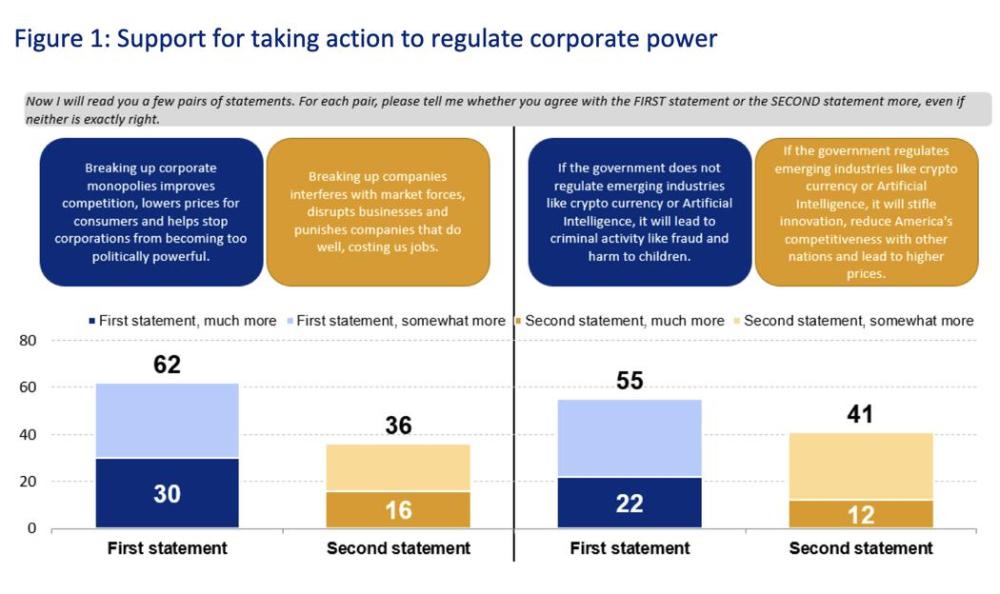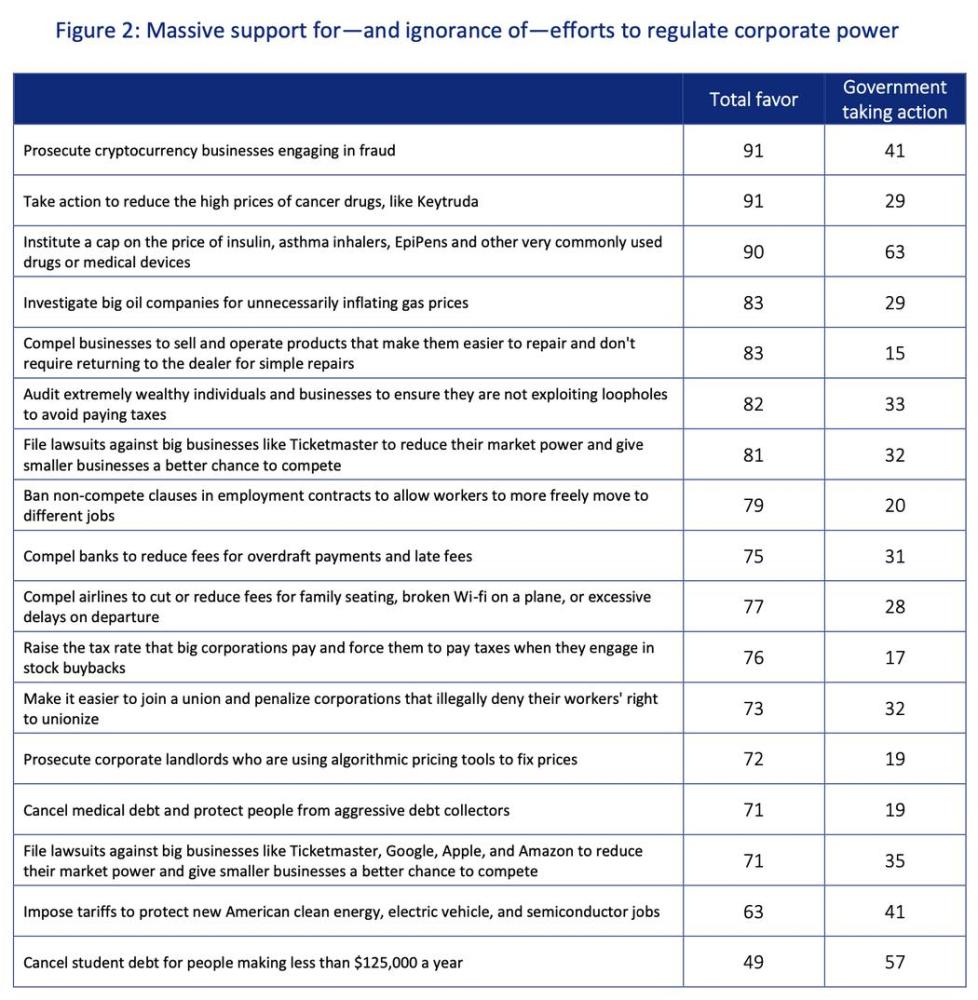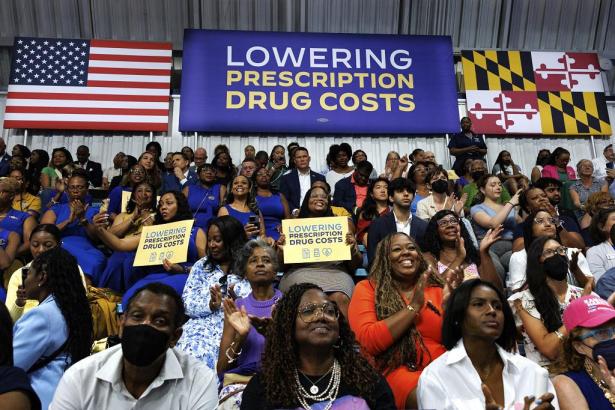This policy rollout by Harris follows several years of debate about the extent to which “greedflation” was responsible for the inflationary pressures squeezing American pocketbooks since 2021. Blaming corporate greed played a significant role in the rhetoric across the speeches at the Democratic National Convention last week, much to the consternation of corporate Democrats, the economics profession, and Republicans, who have called this focus literal communism.
Despite these detractors’ claims, a new polling survey commissioned by More Perfect Union and provided exclusively to the Prospect finds that the populist messaging Harris has leaned into is good politics. The main issue identified by the study is that, while voters almost universally endorse challenging corporate power, very few voters credit the Biden-Harris administration for what they’ve done in this area, because most don’t know about those policies at all.
Conducted by polling firm GQR, the survey contacted 1,700 likely voters of mixed political affiliations and racial makeups in Arizona, Georgia, Michigan, Nevada, North Carolina, Pennsylvania, and Wisconsin. The data is weighted to try to reflect the demographic compositions of each state.
Consistent with other polling, voters see the economy and specifically inflation as a top issue. Fifty-six percent of voters report groceries as the hardest basic good to afford, followed by health care (51 percent) and gas prices (48 percent). What’s novel about the polling though is that the survey digs deeper into what voters attribute as the source of these problems, and how they would prefer the government to fix them.
The most notable finding is that when provided with a set of options, 61 percent of the polling respondents, including two-thirds of Democrats and 63 percent of independents, selected corporate greed as the main cause for rising costs they’re experiencing. The second-highest is government spending at 51 percent—an explanation certainly favored by Republicans—and behind that is the pandemic supply chain crunch at 46 percent.
“As a candidate, when you’re going to engage in any kind of persuasion strategy with voters, it’s corporate power that allows you to talk to anyone across the political spectrum. It’s the number one issue on people’s minds,” said Faiz Shakir, former Bernie Sanders campaign manager and the executive director of More Perfect Union.
These findings are consistent with another recent poll this month by the more centrist group Blueprint. When testing out messaging with voters, Blueprint saw that independents specifically blamed corporate greed by roughly ten points more than the overall polling sample, and that “using antitrust to enforce laws against price gouging and price fixing” was favored overall by a 42-point margin.
There’s a clear bipartisan consensus in the More Perfect Union poll that voters think corporate monopolies are trying to screw consumers in one way or another. Based on the poll, 81 percent of all voters, and a majority of Republicans, agree with the statement “I am concerned that big corporations and businesses are becoming too powerful,” with just 18 percent disagreeing outright. Regionally, that argument is strongest with voters in the Rust Belt region, the states Democrats need to win to keep the White House.
To address these economic conditions, voters support the government action to take on corporate power. After hearing messaging for and against the stance that breaking up companies will help improve competition and lower prices, respondents overwhelmingly chose the former, by nearly a 2-to-1 margin.
At some level, the strength of populist messaging likely has a lot to do with the fact that large corporations have lost public trust. A majority of respondents have a net “very unfavorable” perception of corporate monopolies; they are hated even more than Project 2025 in this sample. Ticketmaster, which was polled individually, had a stronger net negative rating than the federal government or government regulations. It’s a stark contrast to the results for labor unions, which held a strongly favorable rating.

The polling bears out that voters in a general sense still don’t necessarily trust the federal government or government regulation. But when weighing mistrust in the bureaucracy against their hatred of corporate monopolies, voters pick the lesser of two evils and see targeted government action against corporate power as tangibly improving their lives.

The poll asked voters about highly specific government actions that the Biden-Harris administration has pursued or proposed. The more granular the polling gets about these types of regulators against companies, the more they’re seen in a positive light by the public.
In particular, 80 percent of voters or more want the government to use leverage to bring down costs of essential drugs or treatments such as insulin or inhalers, investigate big oil companies for inflating gas prices, enforce right-to-repair rules, ban noncompete agreements, and break up monopolies like Ticketmaster.
But when asked whether these policies are already being pursued by the current administration, the story is more sobering. Not even a third of voters know the government is already trying to ban noncompetes, crack down on junk fees by airlines and banks, break up Ticketmaster and Big Tech, or even make it easier to join a union.
Voters do recognize at a much higher clip (63 percent) that the administration has capped insulin prices and a handful of other drugs, which is likely because Democrats have made this a much more prominent talking point as of late.
Prosecuting fraud by cryptocurrency companies was also one of the Biden-Harris administration’s policies polled in the survey that voters had a comparatively higher degree of awareness of, at 41 percent. Over 90 percent support taking these actions.

These results contradict the recent shift by Democrats, including the Harris campaign, to embrace the cryptocurrency industry. The survey also specifically provided voters with two competing interpretations of crypto as ridden with fraud versus a promising innovation. By 24 points, more voters opted for the statement that read: “if the government does not regulate emerging industries like crypto or artificial intelligence, it will lead to criminal activity like fraud and harm to children.”
Those results make it clear that the crypto game this election cycle is entirely about the enormous spending by the industry’s political action committees instead of what voters think. If politicians went with polling, they’d be moving in the exact opposite direction on the issue.
The poll’s results also indicate that two major court cases, one just announced and the other under way, by the Biden administration should provide tailwinds to the Harris campaign, if she chooses to highlight them.
Harris is not just proposing to crack down on high grocery prices. The Biden-Harris administration is currently suing to block the largest grocery store merger in decades between Kroger and Albertsons on the basis that it could raise prices by reducing competition. The trial started yesterday and will be a major subplot in the election.
The Department of Justice also sued the software pricing company RealPage for facilitating a price-fixing scheme across the nation’s housing markets. In the survey, 72 percent of voters supported the idea to “prosecute corporate landlords who are using algorithmic pricing tools to fix prices.”
===


Spread the word